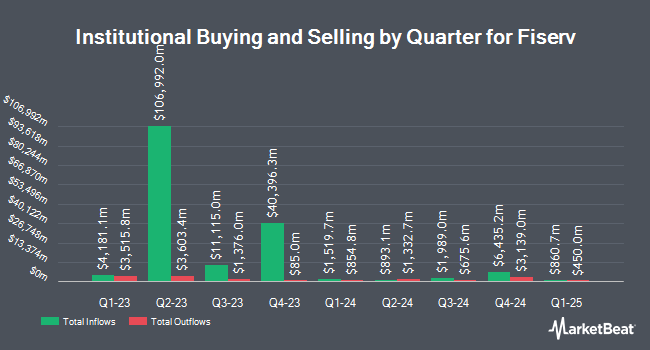Amundi reduced its position in shares of Fiserv, Inc. (NYSE:FI - Free Report) by 1.4% in the 1st quarter, according to the company in its most recent Form 13F filing with the Securities and Exchange Commission (SEC). The institutional investor owned 2,973,749 shares of the business services provider's stock after selling 41,513 shares during the period. Amundi owned approximately 0.54% of Fiserv worth $645,006,000 at the end of the most recent reporting period.
Several other institutional investors have also added to or reduced their stakes in FI. Nuveen LLC acquired a new position in Fiserv during the first quarter valued at approximately $1,722,584,000. JPMorgan Chase & Co. raised its position in Fiserv by 77.2% during the first quarter. JPMorgan Chase & Co. now owns 15,354,767 shares of the business services provider's stock valued at $3,390,793,000 after purchasing an additional 6,691,703 shares in the last quarter. GAMMA Investing LLC raised its position in Fiserv by 21,681.0% during the first quarter. GAMMA Investing LLC now owns 3,821,905 shares of the business services provider's stock valued at $843,991,000 after purchasing an additional 3,804,358 shares in the last quarter. GQG Partners LLC acquired a new position in Fiserv during the first quarter valued at approximately $265,769,000. Finally, Pictet Asset Management Holding SA raised its position in Fiserv by 29.4% during the first quarter. Pictet Asset Management Holding SA now owns 2,878,455 shares of the business services provider's stock valued at $635,308,000 after purchasing an additional 654,228 shares in the last quarter. 90.98% of the stock is currently owned by institutional investors and hedge funds.
Analyst Ratings Changes
Several analysts recently weighed in on FI shares. Monness Crespi & Hardt raised shares of Fiserv from a "sell" rating to a "neutral" rating in a research note on Monday, July 21st. Robert W. Baird reduced their price objective on shares of Fiserv from $225.00 to $185.00 and set an "outperform" rating on the stock in a research note on Thursday, July 24th. Jefferies Financial Group reduced their price objective on shares of Fiserv from $180.00 to $165.00 and set a "hold" rating on the stock in a research note on Tuesday, May 27th. Deutsche Bank Aktiengesellschaft started coverage on shares of Fiserv in a research note on Thursday, July 17th. They issued a "buy" rating and a $200.00 price objective on the stock. Finally, Morgan Stanley reduced their price objective on shares of Fiserv from $268.00 to $266.00 and set an "overweight" rating on the stock in a research note on Monday, July 21st. One research analyst has rated the stock with a Strong Buy rating, twenty-one have issued a Buy rating, two have issued a Hold rating and one has assigned a Sell rating to the company. According to data from MarketBeat, Fiserv currently has an average rating of "Moderate Buy" and an average price target of $207.36.
Check Out Our Latest Research Report on Fiserv
Fiserv Trading Down 0.9%
FI stock traded down $1.22 during midday trading on Friday, hitting $134.96. The stock had a trading volume of 3,574,503 shares, compared to its average volume of 3,736,661. The firm has a market cap of $73.36 billion, a P/E ratio of 22.53, a price-to-earnings-growth ratio of 0.89 and a beta of 0.94. The company has a current ratio of 1.09, a quick ratio of 1.09 and a debt-to-equity ratio of 1.09. Fiserv, Inc. has a 1-year low of $128.22 and a 1-year high of $238.59. The business has a fifty day moving average price of $148.21 and a two-hundred day moving average price of $178.53.
Fiserv (NYSE:FI - Get Free Report) last released its earnings results on Wednesday, July 23rd. The business services provider reported $2.47 earnings per share (EPS) for the quarter, beating the consensus estimate of $2.43 by $0.04. The business had revenue of $5.20 billion for the quarter, compared to analyst estimates of $5.20 billion. Fiserv had a net margin of 16.00% and a return on equity of 19.69%. Fiserv's revenue for the quarter was up 8.0% on a year-over-year basis. During the same quarter in the previous year, the business earned $2.13 earnings per share. Fiserv has set its FY 2025 guidance at 10.150-10.30 EPS. On average, sell-side analysts predict that Fiserv, Inc. will post 10.23 earnings per share for the current fiscal year.
Fiserv Company Profile
(
Free Report)
Fiserv, Inc, together with its subsidiaries, provides payments and financial services technology services in the United States, Europe, the Middle East and Africa, Latin America, the Asia-Pacific, and internationally. It operates through Merchant Acceptance, Financial Technology, and Payments and Network segments.
Featured Stories

Before you consider Fiserv, you'll want to hear this.
MarketBeat keeps track of Wall Street's top-rated and best performing research analysts and the stocks they recommend to their clients on a daily basis. MarketBeat has identified the five stocks that top analysts are quietly whispering to their clients to buy now before the broader market catches on... and Fiserv wasn't on the list.
While Fiserv currently has a Moderate Buy rating among analysts, top-rated analysts believe these five stocks are better buys.
View The Five Stocks Here
With the proliferation of data centers and electric vehicles, the electric grid will only get more strained. Download this report to learn how energy stocks can play a role in your portfolio as the global demand for energy continues to grow.
Get This Free Report
Like this article? Share it with a colleague.
Link copied to clipboard.